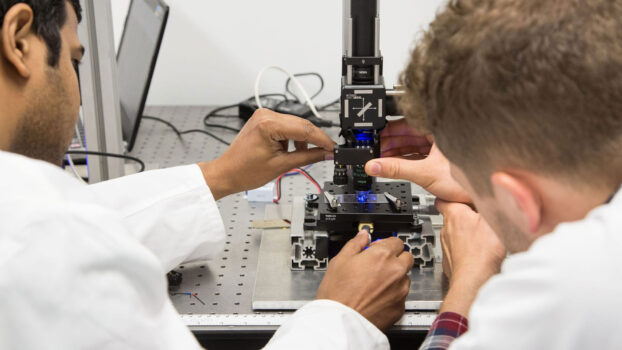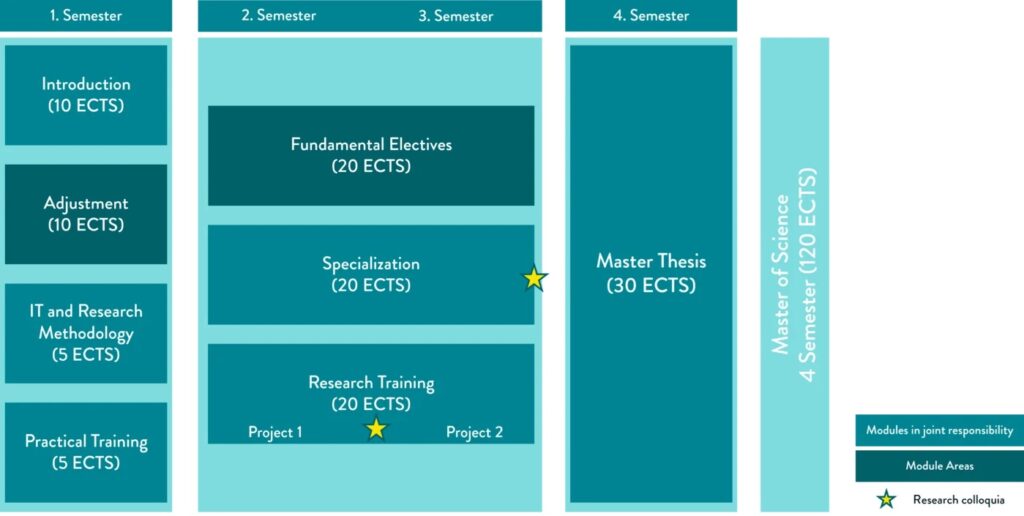Photon Science and Technology
Photon Science and Technology (M.Sc.)

With Photon Science and Technology (M.Sc., Joint Degree Program), you will delve into the fascinating world of light. Optics and its scientific and technological applications are central to numerous developments in physics, biology, medicine, and other scientific disciplines. Industrial applications represent key technologies of the 21st century.
This program is almost unique in Germany in its structure as a joint degree program: students can attend courses at the universities of Erlangen-Nuremberg, Jena, and Karlsruhe and will receive a joint certificate from all three institutions.
As an integrated part of the Max Planck School of Photonics (MPSP), students may apply for a scholarship offered by MPSP. More information about the application process for the scholarship at MPSP can be found here.
- Degree
- Master of Science
- Duration of studies in semester
- 4
- Start of degree program
- Winter semester
- Study location
- Erlangen, Jena, Karlsruhe
- Number of students
- 1-50
- Subject group
- Mathematics, Natural sciences
- Special ways to study
- International degree program, Cooperative degree program
- Teaching language
- completely in English
- Admission Requirements
- Qualification assessment
- Keywords
- Laser, Computational Optics, Photonics, Physics, Quantum
What is the degree program about?
The English-language master’s program Photon Science and Technology (MPST) builds on a bachelor’s degree in physics or a related engineering discipline. It provides both advanced physical fundamentals of optics (from laser physics and solid-state physics to quantum optics) and key photonic applications in science, medicine, and industry.
Students benefit from the combined teaching and research offerings of three leading universities and participate in integrated research projects and lab rotations at the various locations.
-
1st Semester: Introduction and Preparation
In the first semester, a comprehensive course summarizes fundamental concepts from optics and photonics, supplemented by key methods from IT and research methods as well as laboratory practicals. Adapted to the respective prior education the first semester, a comprehensive course summarizes fundamental concepts in optics and photonics, complemented by core methods in IT, research methodology, and laboratory work. Depending on the student’s prior background (Bachelor’s in physics or engineering), additional individual foundational topics are deepened (e.g., quantum mechanics, measurement techniques)2nd and 3rd Semesters
In the second and third semesters, students may specialize in theoretical and applied areas of their choice, guided by experienced academic mentors. Due to the collaboration of three universities, the program offers an exceptionally broad range of subjects, covering fundamental physics (quantum optics, nonlinear optics, laser physics, etc.) and numerous applications (microscopy, optoelectronics, laser processing, pattern recognition, biophotonics, and more).
In addition to lectures, students engage in two research projects that introduce them to current topics and the different university locations.
4th Semester
The final semester is dedicated to the master’s thesis, typically conducted as a joint research project involving all three universities.

-
Key Advantages of the MPST Program
- Access to teaching and research at three top universities
- Opportunity to receive a scholarship from the Max Planck School of Photonics
- Pathway to a Ph.D. within MPSP
-
This joint program requires students to be willing to travel between the participating universities. The entire program is conducted in English. Enrollment must be completed at all three universities. At the University of Karlsruhe, international students who are not from an EU country are required to pay a fee of €1500 per semester. Further information on fees at the University of Karlsruhe can be found here. Further information on studying at three universities can be found on the Max Planck School of Photonics website, e.g. in the FAQ section.
If you have any questions about the program, please contact Dr. Jürgen Großmann.
-
- Admission requirements (first semester)
- Qualification assessment
- Application deadline winter semester
-
01.12.
- Content-related admission requirements
-
A bachelor’s degree A bachelor’s degree in physics or a relevant engineering discipline (e.g., electrical engineering, depending on individual curriculum). The bachelor’s program should include sufficient content in experimental physics (electrodynamics/optics) and linear algebra/calculus.
Proof of sufficient English language skills (at least B2 level) is also required.
Language skills
- German language skills for international applicants
- No DSH, English (level B2, CEFR)
- General language skills
-
English level B2 or equivalent in an internationally recognized test.
- Details and notes
-
Application must be submitted until December 1st, almost one year in advance before the start of studies.
Do you need help or more information?
Our Student Advice and Career Service (IBZ) is the central point of contact for all questions about studying and starting a degree programme. Our Student Service Centres and subject advisors support you in planning your studies.